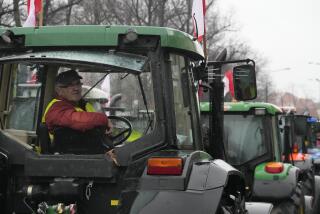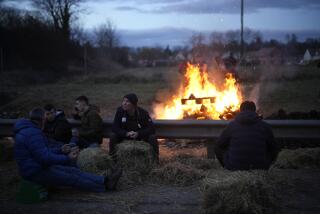Poland’s Farmers Find Their Plows Mired in Muck of Central Planning : East Bloc: Surprisingly, 70% of Poland’s farms are in private hands. The problem is that the state still owns the auxiliary industries.
- Share via
ROGOW, Poland — Janusz Strzechowski counts himself as one of Poland’s more fortunate farmers. His modest but tiny spread in this central Poland agricultural region boasts three tractors, five pesticide sprayers, a small farm wagon and a shed full of fertilizer, sheet metal and tires.
“Not everybody has what I have,” he explains to a guest.
But Strzechowski is no J. R. Ewing. He maintains his stockpile of farm machinery--all old clunkers by U.S. standards--so that he can cannibalize it for spare parts. He figures his cache of fertilizer, some of it as old as three years, is losing its potency. The farm wagon, made of wood, is barely large enough to hold two coffins.
Strzechowski’s “wealth” precisely illustrates the plight of Polish agriculture just as the new, non-Communist government is counting on farmers to help pull the nation out of economic atrophy and provide a base for prosperity during the uncertain shift toward a market-oriented economy.
Farming itself, which accounts for 26% of Poland’s national output, is the crown jewel of the Polish economy. Fully 70% of Poland’s farms remain in private hands because the Communists did not want to risk a peasants’ revolt.
The problem, as Strzechowski knows all too well, is that the state still owns the auxiliary industries--tractor and fertilizer manufacturers, for example--and the food-marketing and -processing systems. Huge agribusiness monopolies provide farmers with their supplies and equipment and process and distribute what they grow.
As a consequence, Polish agriculture is in a mess. The Solidarity government’s ability to clean it up may go a long way toward determining its chances of survival.
“Poland will not reform its economy and will not succeed without agriculture,” says Gregory Vaut, director of the Warsaw-based Foundation for the Development of Polish Agriculture.
The obstacles are many. Poland’s private farms are far too small to be profitable. Although Rogow’s big state-run farm boasts almost 900 acres, most of Poland’s farms are minuscule spreads of 10 to 25 acres, only a small fraction of the 400- to 1,200-acre expanses that are typical of America’s Midwest.
And although private ownership prevails on the farms themselves, central planning has strangled both the industries that produce farm equipment and the process of getting agricultural products to market.
By U.S. standards, the bulk of Poland’s 2.8 million farms are woefully under-equipped and poorly supplied. Most farmers have tractors and cultivators, although Poland’s bureaucracy this year allocated tractors to the very regions that needed them least.
But farm wagons, sprayers and more specialized machinery such as mowers, balers, manure spreaders and loader-elevators--staples on most American farms--are virtually unknown. Pickup trucks are nowhere to be seen; horse-drawn farm wagons are common. Basic storage equipment, such as silos and refrigerated trucks, is rare.
Finding spare parts can be a Herculean task. The last time Strzechowski needed a tractor piston, it took him six months of waiting and countless trips to state-run parts distribution centers around the region before he could find one he could buy. Even then, he had to grease the deal with a bottle of cognac for the local supplier.
Stanislaw Janek, another Rogow farmer, had to suspend planting for several weeks earlier this year until he could find the spare parts to fix a plow. But no matter, he is happy: After six years of waiting, he has just bought a pesticide sprayer, through the chance intervention of a visiting official.
His big dream is to find an ordinary conveyor belt that could help load his rye into a farm wagon, but he isn’t counting on it. “I would have to kill for it,” he snorts.
Andrzej Plusa, also a farmer here, complains about a government regulation that requires him to turn in an old, broken part every time he buys a new one from the state distribution center. “It’s simply idiotic,” he says.
Miroslaw Konski snagged a spanking-new tractor for his 12-acre farm this year, but only after waiting five years for the local agricultural supply committee, which under the Communist system had to approve all such purchases, to give its permission.
“The state-run farms don’t have to go through all this,” Konski complains. They are simply allocated whatever they need and can buy directly from the factory.
State-run farms indeed are visibly better-equipped. While private farmers here are lucky to have even a wooden wagon, Rogow’s state-operated farm sports an array of green-painted steel bulk carriers, a four-wheel-drive tractor and all sorts of other rudimentary equipment. It also employs 52 people--about 50 more than would be needed to operate an American farm of comparable size.
“There really are two distribution systems here,” Strzechowski says, “one for the state-run farms and the other, the leftovers, for us.”
Kazimierz Marciniak, the farm’s vice director, insists that the state-run farms don’t have it nearly as good as the private farmers say. Although the state farm has automatic allocations for whatever equipment or input it needs, “it doesn’t do us much good because there’s nothing available to buy,” he says.
One of Marciniak’s 52 workers has been assigned to do nothing else than travel around Poland looking for spare parts. “Last week, he found what we needed in Gdansk,” Marciniak says with some pride.
With all these problems, Polish crop yields are relatively low to begin with. And much of what Polish farmers grow never makes it to the nation’s stores. U.S. officials estimate that as much as 40% of Poland’s crops rot because of poor storage.
Because hygiene standards are low and there is a lack of refrigeration, much of the nation’s milk supply is contaminated, and consumers routinely boil even the supposedly “good” milk before drinking it.
Although the apple harvest in this region of central Poland was early this year, for example, the nearest juice-processing plant to Rogow refused to open its doors until the traditional July 20 start-up date. In the meantime, a hefty portion of the crop went bad and was thrown out or fed to animals.
Western experts insist that the cures to Poland’s agricultural woes are no mystery.
Jan Vanous, research director of PlanEcon, a Washington-based firm that specializes in Eastern European economic problems, would start with the “rapid consolidation of farms.” Then comes the breakup of the nation’s agricultural-supply and food-processing monopolies into smaller, preferably privately owned companies with credible competition that will make farm inputs more readily available.
Finally, Vaut says, farm prices must rise sharply and stay high long enough to persuade farmers that they will get more by investing and increasing their production. “Because of the years of history, their response is likely to be a slow one,” he says.
Consolidating farms seems easy enough. Statistics here show that one-quarter of Poland’s farmers are over retirement age and stay on only for subsistence, which could be replaced by a social security program. Another one-fourth are part-timers--factory workers who farm to pick up extra cash.
The government is planning to curb state-owned monopolies anyway, and breaking up agribusiness conglomerates ought to be easier than most. Andrzej Stelmachowski, the majority leader of the Polish Senate, says Poland’s farmers “are being surrounded by a stranglehold of monopolies. Therefore we must break the system.”
But domestic political considerations blocked a recent attempt to end central planning by agriculture-related ministries. “The project has disappeared off the radar screens politically,” says Jacek Szymanderski, head of the fledgling Solidarity Polish Peasants’ Party. “The monopolies are so deeply embedded, it’s impossible to weed them out.”
Although officials want to spur output, they also need to keep retail food prices from soaring, lest they spark a consumer rebellion.
“If we give farmers an opportunity to invest (by raising farm prices), we will soon have unrest in the cities that will sweep out the government,” Szymanderski says. “But the government is under the influence of the workers, who are not in favor of good agricultural policies.”
Here in Rogow, Strzechowski isn’t counting on anything. “It’s very difficult,” he says, “to change anything here.”
More to Read
Sign up for Essential California
The most important California stories and recommendations in your inbox every morning.
You may occasionally receive promotional content from the Los Angeles Times.










